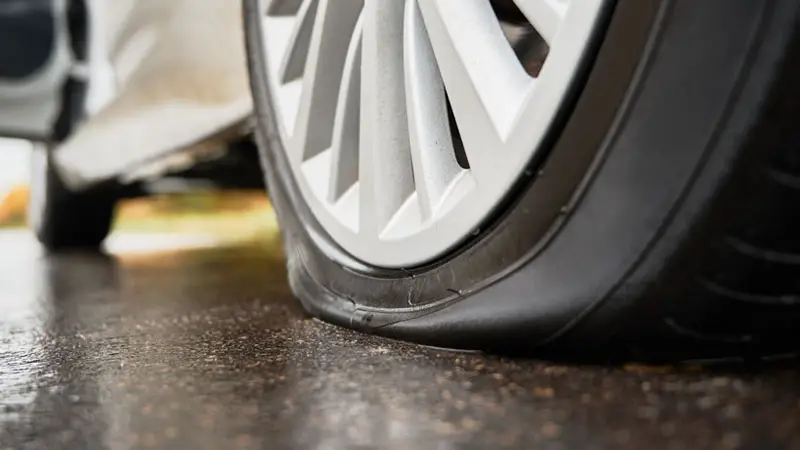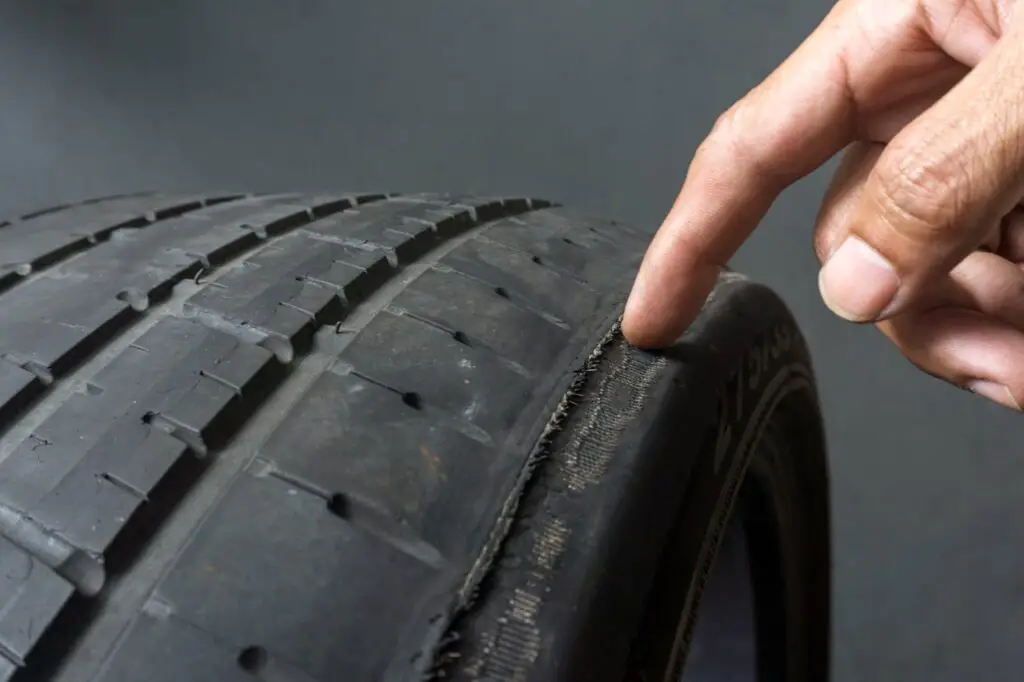Can a bad tire make your car shake? Yes, a bad tire can cause your car to shake. Issues such as unbalanced tires, uneven wear, or damage like punctures or bulges can create vibrations that are felt through the steering wheel or the seat, especially at higher speeds.
When you drive, your tires are responsible for providing traction and ensuring a smooth ride. However, when one or more tires go bad, they can create vibrations that make the car shake. This can happen for various reasons, including improper tire pressure, unbalanced tires, worn-out tires, or damaged tire components.
In this article, we’ll explain whether a bad tire can make your car shake, the common causes of tire-related shaking, how to identify tire issues, and what you can do to address them.

Contents
- 1 Tire-Related Vibrations
- 2 Common Causes of Tire-Related Shaking
- 3 Symptoms of Tire-Related Shaking
- 4 Diagnosing Tire-Related Shaking
- 5 How to Prevent Tire Shaking
- 6 Frequently Asked Questions
- 7 Conclusion
Tire-Related Vibrations
Tire vibrations or shaking can be caused by a variety of factors, with one of the most common reasons being a bad tire. A “bad tire” can refer to many different issues, such as worn-out tread, improper tire alignment, or damage caused by hitting potholes or curbs. These issues can lead to imbalances in the tire’s structure, which in turn causes vibrations while driving.
How a Tire Can Make the Car Shake
When a tire is unbalanced, improperly aligned, or damaged, it may cause uneven contact with the road surface. This uneven contact leads to vibrations that travel through the suspension and chassis, which are felt inside the car. The vibrations can be most noticeable in the steering wheel, the floorboard, or the seat. It’s essential to understand the different causes of tire-related shaking so that you can identify the problem early and prevent further damage.
Common Causes of Tire-Related Shaking
Tire-related shaking can be caused by a variety of issues, many of which are tied to the condition of the tires themselves. Identifying the specific cause of the vibration is essential for addressing the problem effectively and ensuring a smooth driving experience.
1. Unbalanced Tires
Tires are balanced to ensure that they rotate smoothly without creating any unwanted vibration. Unbalanced tires are one of the most common causes of shaking while driving, especially at higher speeds.
How Unbalanced Tires Cause Shaking:
- Imbalance in Rotation: A tire that is out of balance has uneven weight distribution, causing it to wobble or vibrate as it rotates.
- Shaking at Specific Speeds: Unbalanced tires often cause vibrations that are more noticeable when driving at certain speeds, typically between 50 and 70 mph. The faster you go, the more pronounced the shaking can be.
Related Article
How to Balance a Tire
Are Tires Balanced When Installed?
Tire Mount and Balance Cost
2. Uneven Tire Wear
Over time, tires can wear unevenly due to several factors, such as poor alignment, misbalanced tires, or lack of tire rotation. Uneven tire wear creates an imbalance that can result in a shaky driving experience.
How Uneven Tire Wear Affects Your Vehicle:
- Cupping or Scalloping: Uneven wear often leads to cupping or scalloping on the tire surface, which causes a bumpy, uneven ride.
- Tire Noise: Uneven wear also creates noise that you can hear while driving, often accompanied by vibrations.
3. Damaged or Worn Tires
Damaged or worn-out tires, whether from debris, road hazards, or general wear and tear, can also lead to shaking while driving.
Signs of Damaged Tires:
- Bald Spots: Bald spots or worn tread can cause uneven road contact, leading to vibrations.
- Bulges or Blisters: Tires with bulges or blisters from impact with curbs or potholes can lead to structural instability, causing your car to shake.
4. Improper Tire Inflation
Both over-inflated and under-inflated tires can cause shaking. When tires are not inflated to the recommended pressure, they lose their ability to provide proper contact with the road, which affects the balance of the vehicle. Here is a guide about Low Tire Pressure Cause Vibration.
How Tire Pressure Affects Shaking:
- Under-inflation: When tires are under-inflated, they wear unevenly and can cause the vehicle to shake. The under-inflated tire has more flex and less stability.
- Over-inflation: Over-inflated tires can cause excessive stiffness, reducing their contact with the road and leading to vibrations or shaking, especially on uneven surfaces.
5. Damaged Wheel or Suspension Components
A bent or damaged wheel can lead to misalignment, which may cause tire wear and vibrations. Additionally, problems with the suspension system, such as worn-out shock absorbers or struts, can also contribute to the shaking.
How Suspension Issues Contribute to Tire Shaking:
- Misalignment: Misaligned wheels cause uneven wear on the tires and can lead to vibrations while driving.
- Worn-out Suspension: If the suspension system is damaged or worn, it can cause the car to shake, as it cannot properly absorb the bumps from the road.

Symptoms of Tire-Related Shaking
Identifying the symptoms of tire-related shaking is key to diagnosing the problem. Shaking caused by bad tires is typically noticeable in the following ways:
1. Shaking at Specific Speeds
If the car only shakes at certain speeds, especially between 50-70 mph, it’s likely due to unbalanced tires. The vibration can often be felt in the steering wheel or the seat, depending on the location of the issue.
2. Vibrations in the Steering Wheel
Vibrations felt in the steering wheel are a common sign that something is wrong with the tires. This could be caused by unbalanced tires, uneven tire wear, or even issues with the steering components.
3. Vibrations While Braking
If the shaking happens primarily when you apply the brakes, this could indicate warped brake rotors rather than a tire issue. However, if the vibration is happening regardless of braking, it’s likely related to the tires or suspension.
4. Tire Noise
A noisy tire can be a sign of uneven wear or tire damage. The noise may be accompanied by vibrations, making it clear that there is an issue with the tire or suspension.
Diagnosing Tire-Related Shaking
To diagnose the cause of tire-related shaking, follow these steps:
- Visual Inspection: Inspect the tires for any visible damage, such as bulges, punctures, or worn-out tread.
- Check Tire Pressure: Ensure that all the tires are inflated to the recommended pressure.
- Wheel Alignment Check: Take the car to a professional to check for any alignment issues that might be causing uneven tire wear.
- Balance Test: Have the tires balanced by a professional to eliminate any wobbling or vibration caused by imbalance.
- Tire Rotation: If tires show signs of uneven wear, rotating them can help prevent further shaking.
How to Prevent Tire Shaking
Tire-related shaking can be caused by a variety of issues, many of which are tied to the condition of the tires themselves. Identifying the specific cause of the vibration is essential for addressing the problem effectively and ensuring a smooth driving experience.
1. Regular Tire Maintenance
Routine tire maintenance, including tire rotations and balancing, is essential to prevent shaking. This ensures even tire wear and prolongs the life of the tires.
2. Keep Tires Properly Inflated
Check the tire pressure regularly to make sure the tires are inflated to the recommended level. This simple step can prevent a variety of issues, including shaking caused by under-inflated or over-inflated tires.
3. Fix Alignment Issues Promptly
If your car pulls to one side or the steering wheel shakes, it could be a sign of misalignment. Have the alignment checked regularly to prevent uneven tire wear and improve driving comfort.
4. Inspect Tires for Damage
Regularly inspect your tires for damage caused by road hazards, such as punctures or cracks. Replace damaged tires immediately to avoid further issues with shaking.
Frequently Asked Questions
Here are some FAQs about bad tire make your car shake –
1. Can uneven tire wear cause shaking?
Yes, uneven tire wear can cause vibrations and shaking due to misalignment or improper tire pressure.
2. How can I tell if my tire is unbalanced?
You may notice shaking or vibrations that become more pronounced at higher speeds. A mechanic can confirm unbalanced tires with a balancing test.
3. Can bad tires make the car shake when braking?
Yes, if the shaking occurs while braking, it could be due to uneven tire wear or issues with the brake components.
4. How do I stop my car from shaking?
Regular tire maintenance, proper tire inflation, wheel alignment, and addressing any tire damage will prevent shaking.
5. How often should I check my tires for damage?
It’s a good idea to inspect your tires every month and before long trips to catch any issues early and prevent shaking.
Conclusion
Can a bad tire make your car shake? Absolutely. Shaking caused by bad tires is a common issue that can arise from unbalanced tires, uneven wear, improper inflation, or damaged tires. Addressing these issues early can improve your vehicle’s performance, handling, and safety.
Regular tire maintenance and inspections can help prevent tire-related shaking and extend the lifespan of the tires. If your car shakes, don’t ignore the symptoms—identify and resolve the issue promptly to ensure a smoother and safer driving experience.